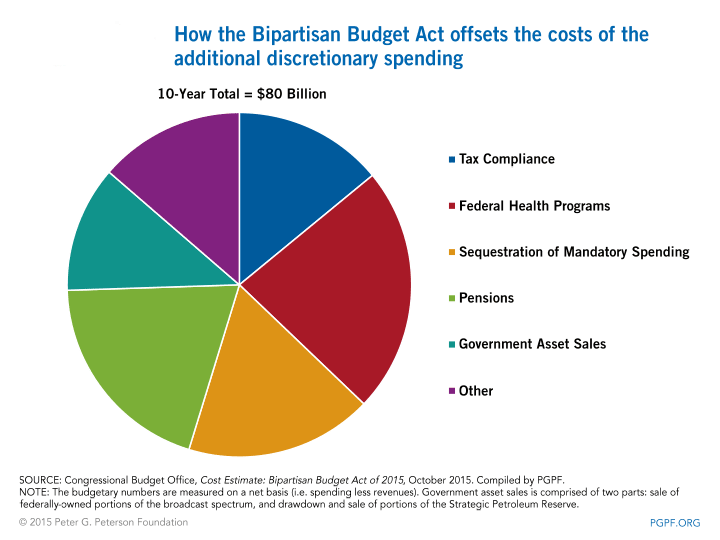It’s a good thing Paul Ryan grew a beard because he’s playing Santa Claus this year by giving out $1.1 trillion in “gifts for just about everyone” wrapped up in a massive Omnibus bill.
The Republican House Speaker from Wisconsin unveiled a spending package that breaks a yearlong impasse between the White House and congressional Republicans over spending policy heading into the 2016 presidential and congressional campaigns.
With growing public concern about the ISIS terrorist threat and nagging indications that the economic recovery hasn’t been realized fully, the new spending package is likely to win congressional approval by late this week. It is laden with increased funding for military readiness, anti-terrorism activities and economic development and job training funding for both rural and urban areas.
Related: Why Is Congress Giving Away $500 Billion in Unfunded Tax Cuts?
“In divided government, no one gets exactly what they want,” Ryan said on Wednesday. “But this week, we have completed two bipartisan agreements that advance Republican priorities.”
“We listened to our members. We've let our committees take the lead. And I'm pleased that we've been able to accomplish so many things for the American people,” he added.
Coupled with another package of more than 50 business and individual tax breaks that will cost the Treasury more than $650 billion over the coming decade, the tentative spending deal is likely to attract broad bipartisan support in the House and Senate, even as some conservative lawmakers and outside groups complain about a missed opportunity to contain spending.
“In fewer than 48 hours, lawmakers will likely be asked to vote on two massive bills that were negotiated behind closed doors over the past several weeks,” Michael A. Needham, Heritage action for America chief executive, said in a statement. “Heritage Action is reviewing both bills and will educate conservative constituents across the country on the policies buried in all 2,242 pages.”
Related: Why Congress Wants Sweeter Tax Breaks for Special Interests
The debate over spending priorities was overshadowed for months by “poison pill” policy riders that the GOP was attempting to add to the legislation – including cuts in funding to Planned Parenthood, blocking Syrian refugees from resettling in the U.S. and defunding Obama’s executive actions on immigration. The Republicans in the end dropped their demands for most of those amendments although they scored several victories. Those include ending a 40-year ban against U.S. exports of crude oil and obtaining a two-year postponement of two controversial tax provisions of the Affordable Care Act.

Yet the shape of the massive spending program for the remainder of the fiscal year was largely preordained in late October, when outgoing Speaker John Boehner (R-OH) helped negotiate the 2015 Bipartisan Budget Act with Obama and Senate Majority Leader Mitch McConnell (R-KY) that raised spending caps enacted in 2011.
The so-called “sequester” under the budget control act imposed legal limits on government discretionary spending and mandated automatic, across the board spending cuts to enforce those spending caps. The law worked initially in slowing the growth of spending, but Congress has now twice decided to lift the caps to satisfy demands for more spending.
Related: Agencies Spent $4.4 Billion on Self-Promotion, Violating Federal Rules
Striking a deal on that budget agreement constituted a much heavier lift for lawmakers and the Obama administration than reaching a final agreement this week on how to spend the billions of additional funds freed up by raising the caps. Boehner did Ryan a big favor by taking the heat for concessions he had to make to the Democrats in order to achieve Republican goals, including bolstering defense spending.
Big Spending, Bigger Deficits?
By lifting the caps, Congress had an additional $80 billion to play with over the next two years -- $50 billion in fiscal 2016 and $30 billion in 2017 – with the increases evenly split between defense and domestic programs. Boehner, who resigned last month, said he wanted to “clean the barn” for his successor, Ryan.
GOP and Democratic leaders insisted that the new budget deal is fiscally responsible and will actually reduce the deficit in the distant future, despite assertions by budget watchdog groups and conservative activists that it is riddled with budget gimmicks that mask the true cost of the plan.
Over the coming ten years, the new budget will increase on-budget deficits by about $70 billion, while decreasing the off-budget deficit for entitlement programs and other activities by $10 billion, according to an analysis by the Committee on a Responsible Federal Budget.
Related: Boehner’s Last Stand — A Budget Deal That Raises the Debt Ceiling
In the second decade, however, the budget deal is projected to reduce the on-budget deficit by $45 billion and the off-budget deficit by $40 billion, according to the analysis. Thus, over the next 20 years, the deal would reduce overall deficits by $25 billion. But of course, that assumes that Congress doesn’t decide to totally scrap the spending caps and accelerate spending, or resort to more budget gimmicks to hide the true cost of their policies.
Those projections don’t take into account the estimated $650 billion or more of foregone tax revenues in the coming decade because of the decision this week to extend or permanently enact dozens of pricey tax breaks for businesses and individuals.
The increased funding in the $1.1 trillion omnibus spending bill awaiting final action will go for a panoply of government programs and initiatives, according to a document prepared by the Senate Appropriations Committee.
Defense Spending Highlights
On the defense front, the agreement will provide $514 billion for overall operations, weaponry and contracting and $58.6 billion for an overseas contingency account that pays for the war in the Middle East.
The deal will increase spending on combat readiness by $608 million, fully fund Obama’s request of $715 million for Iraq military training and equipment, provide $1.1 billion for helping friendly countries defend against terrorism, and provide military and civilian employees in the Defense Department with a 1.3 percent pay raise.
Domestic Spending Highlights
On the domestic front, there will be hundreds of millions more for rural and urban job training, single family housing loans in rural America, a program to combat the epidemic in heroin use, $50 million in aid to state and local governments and universities to prepare for the possibility of terrorist attacks, and a $2 billion increase in medical research at the National Institutes of Health, including efforts to find a cure for the Alzheimer’s disease.





